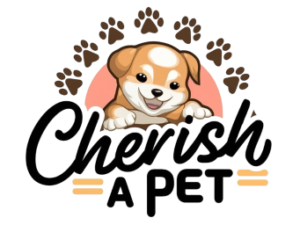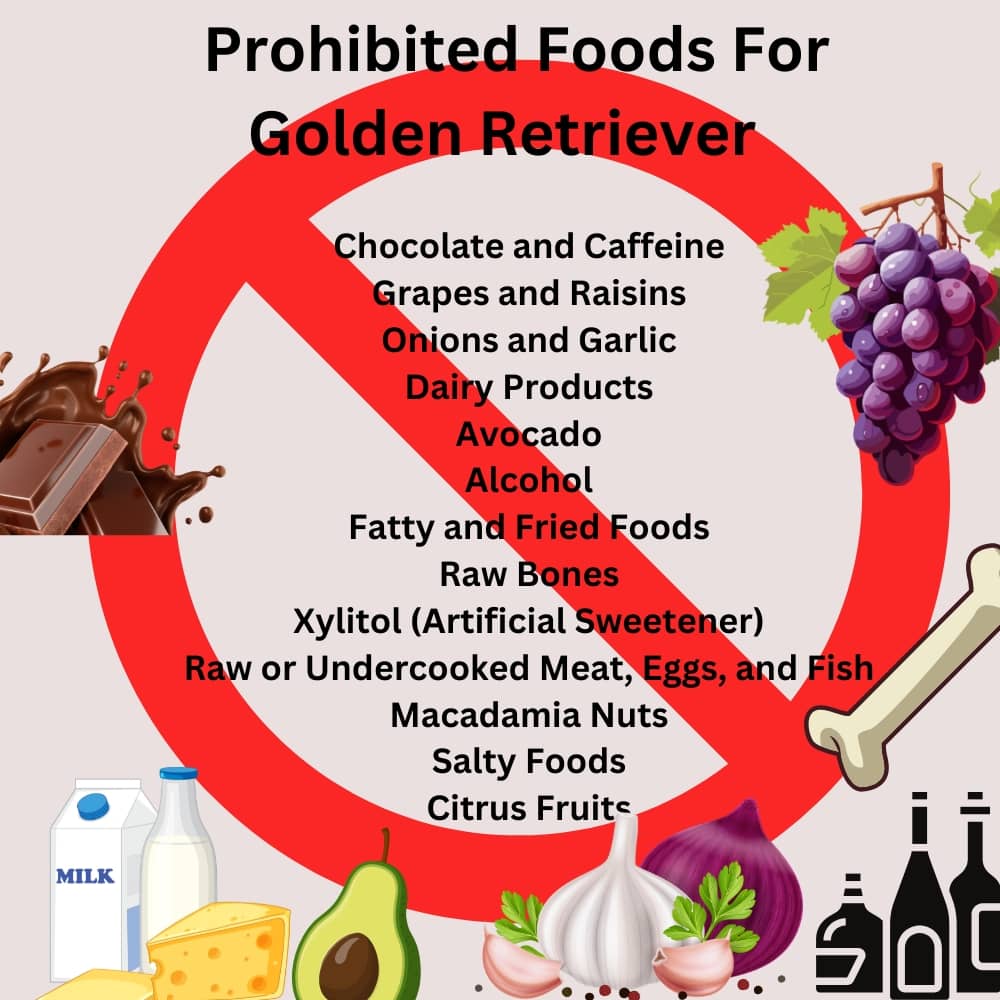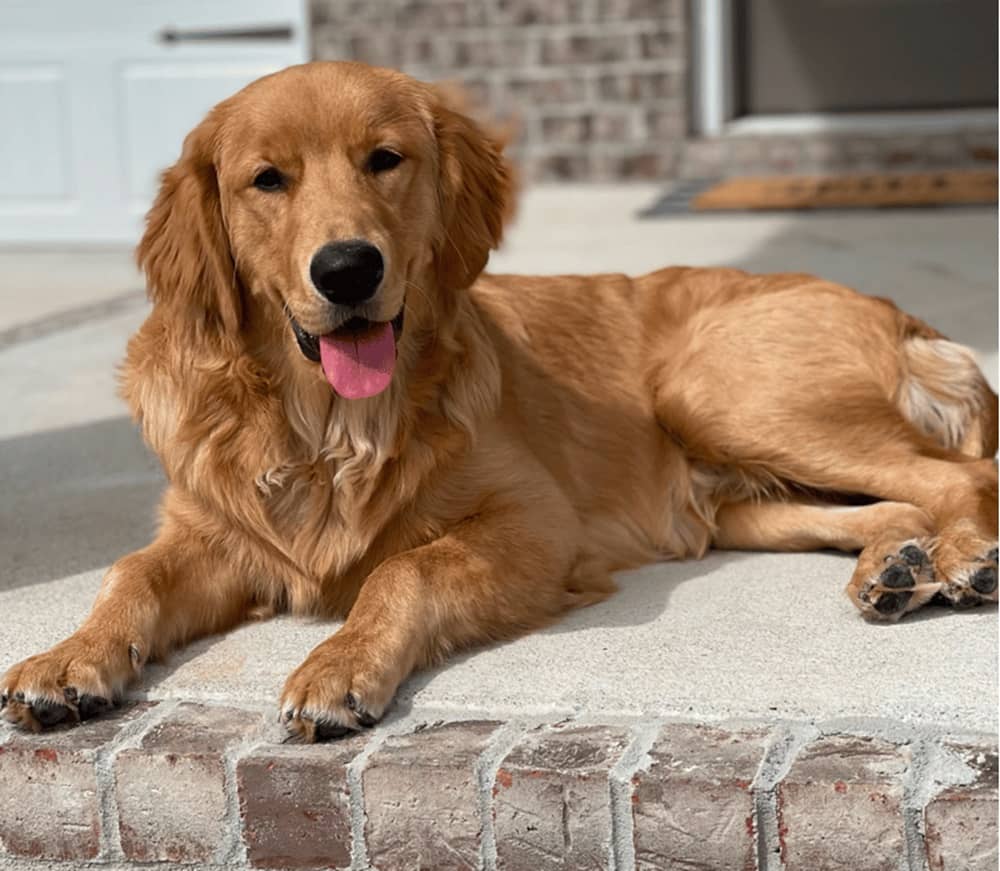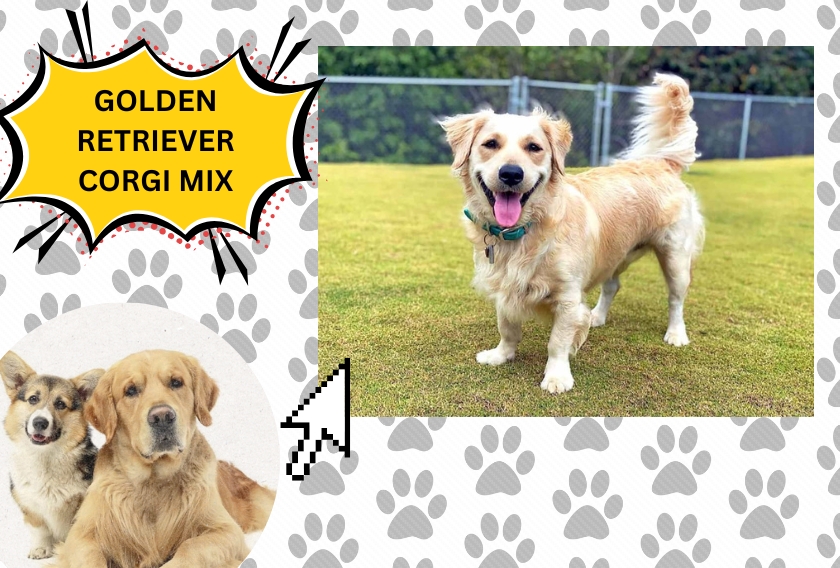6-month-old golden retrievers are in a very exciting stage of their lives. They are growing more fast. If you have a golden retriever between 6-12 months old, you need to know what specific needs they require and how to take care of them. Let’s look into the article and see the growth between the different ages of their lifetime.
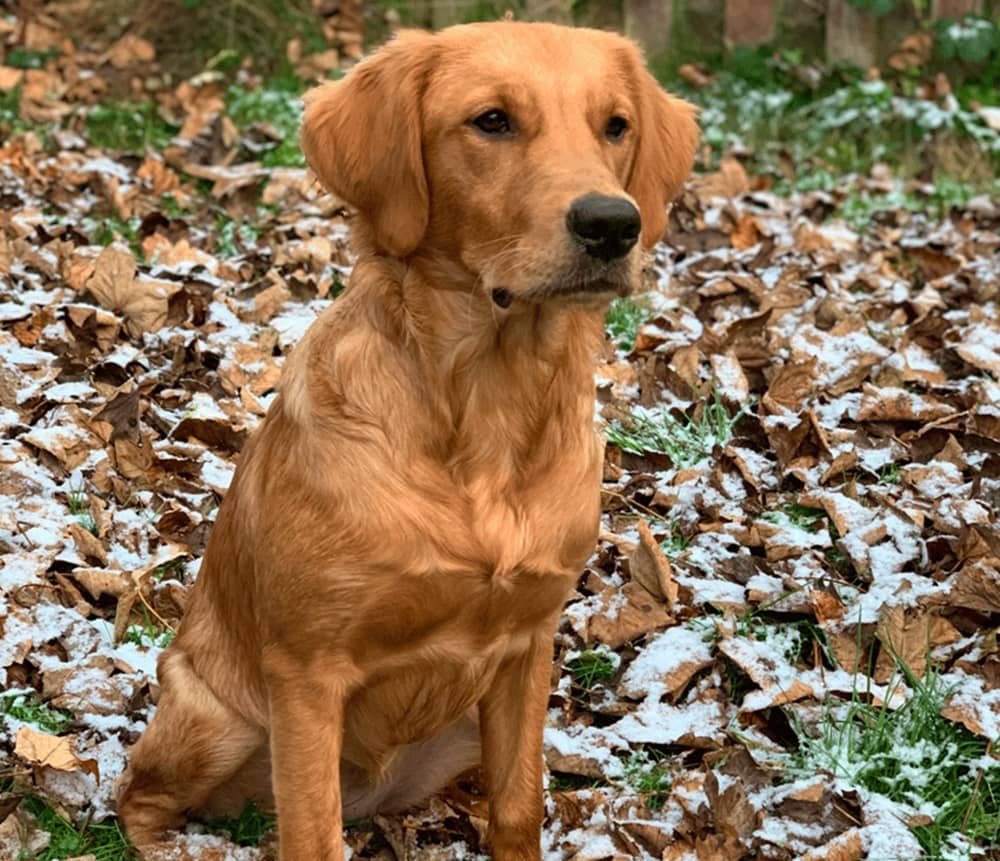
6-12 Months Golden Retriever Size and Weight
Male Golden Retrievers are generally larger and heavier than females. Golden retrievers’ growth during the 6-12 months is fast.
Golden Retriever Male, 6–12 Months Old
An energetic, inquisitive, and increasingly independent male Golden Retriever puppy is between six and twelve months of age. He might challenge limits at this point, so regular training and encouragement are crucial. He will require a nutritious, well-balanced diet to support his development as his body grows. In order to manage his high energy levels and avoid boredom, regular exercise is essential. To control shedding and maintain the health of his coat, grooming is still crucial. For him to develop into a self-assured and amiable adult dog, socialization is essential.
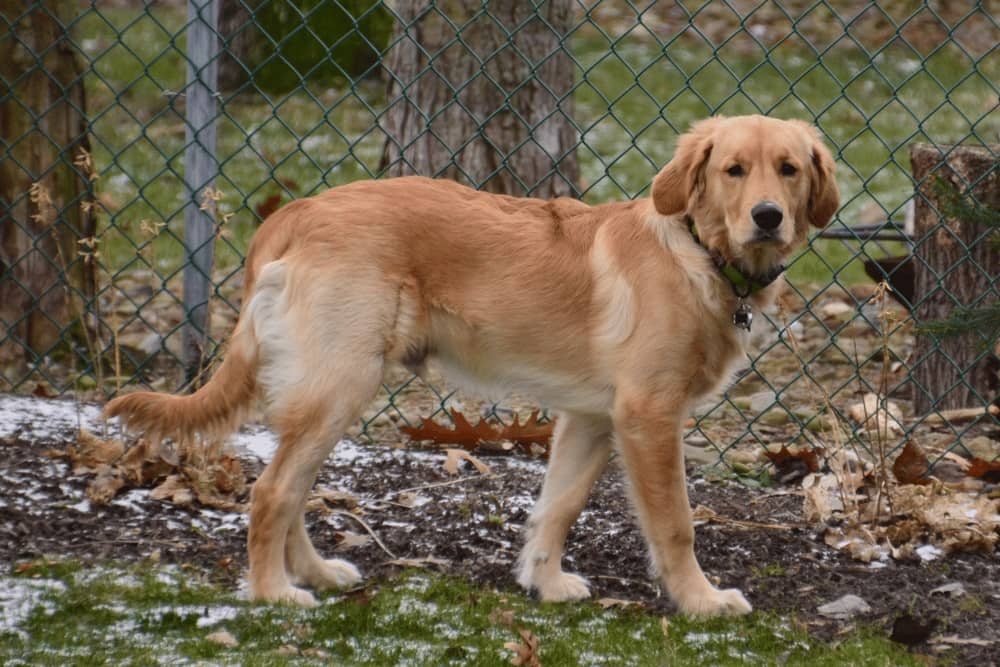
6-12 Months Male Golden Retriever Size and Weight Chart
Their growth and weight can vary based on factors such as diet, exercise, and genetics. You should always check your dog’s weight and height and ensure they are receiving the right amount of nutrition and care.
| Age (Months) | Weight (lbs) | Height (inches) |
|---|---|---|
| 6 Months | 40-45 | 20-22 |
| 7 Months | 45-50 | 21-23 |
| 8 Months | 48-55 | 21-23 |
| 9 Months | 50-60 | 22-24 |
| 10 Months | 55-65 | 22-24 |
| 11 Months | 60-70 | 23-24 |
| 12 Months | 65-75 | 23-25 |
Golden Retriever Female, 6–12 Months Old
At 6 to 12 months of age, a female Golden Retriever puppy is just as lively and active as her male counterpart, but she tends to have a calmer and more loving attitude. She needs to maintain her physical and mental well-being during this critical period of growth, which calls for a healthy diet and frequent exercise. She should be taught orders and appropriate behavior through regular, interesting training sessions. The basis for a contented, well-mannered adult dog will be laid by taking care of her glossy hair and making sure she is well-socialized with people and other animals.
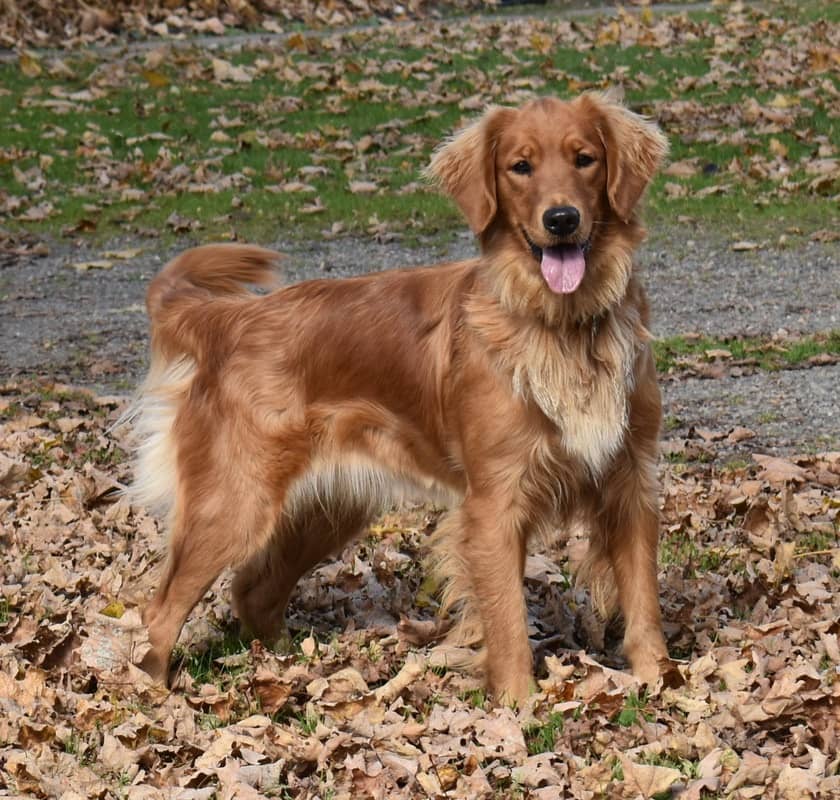
6-12 Months Female Golden Retriever Size and Weight Chart
| Age (Months) | Weight (lbs) | Height (inches) |
|---|---|---|
| 6 Months | 35-40 | 19-21 |
| 7 Months | 38-42 | 19-22 |
| 8 Months | 40-45 | 20-22 |
| 9 Months | 42-47 | 20-23 |
| 10 Months | 43-48 | 21-23 |
| 11 Months | 45-50 | 21-23 |
| 12 Months | 50-55 | 21-24 |
6-12 Month-Old Golden Retriever Pictures

6-12 Month-Old Golden Retriever Diet and Nutrition
For 6-12 months golden retrievers, diet is as important as other things, such as setting up their bed, maintaining the environment, their playtime, etc.
A Golden Retriever diet between 6 and 12 months is essential to support their growth and development. At this stage, they are transitioning from a growing puppy to a more mature dog, and their nutritional needs must be met to ensure they develop into healthy adults. Here is the diet given below that you should feed to your golden retriever pup at each age within the 6-12 month range.

6-7 Month-Old Golden Retriever Diet
At the 6-7 month-old stage, Golden Retrievers’ growth rate starts to slow down. Their diet should focus more on supporting this growth and preventing overfeeding to avoid some health issues.
- Their diet should contain 20–30% of daily protein. Protein helps in building muscles and developing tissues properly.
- The Golden Retriever diet should have 8–15% fat content. It is good for their skin health and gives them more energy.
- Golden retriever puppies at this age need 1200-1600 calories per day. It also depends on their size and activity level. Do not overfeed them and maintain their calorie levels. Overfeeding can lead to obesity, which can strain their joints later in life.
You can offer high-quality puppy food that is specially formulated for large dog breeds. Look for kibble, as it supports bone development and joint health.
8-9 Month Old Golden Retriever Diet
At this age, your Golden Retriever is nearing 75% of their adult size. They need lots of nutrients for bone growth and muscle development.
- Protein Level: 20-30% to support continued growth.
- Fat Content: 8-12% fat content.
- Calories Per Day: Around 1400-1800 calories daily.
Now, they are grown enough, so you can slowly transition their food to adult food and check their progress. Make sure to feed them large-breed formulas, which are lower in calories but rich in essential nutrients like glucosamine for joint health.
10-12 Month-Old Golden Retriever Diet
At this stage, your Golden Retriever is almost at their full adult size. Their dietary needs will shift to focus more on maintaining energy levels and supporting healthy weight. And still providing for some growth and muscle development.
- Protein: 18-25% protein content.
- Fat: 8-12% fat content.
- Calories: Around 1600-2000 calories daily.
You can continue with a large-breed adult formula that maintains a balanced diet. It will support their healthy joints, a shiny coat, and full vitality.
General Feeding Tips for Golden Retrievers:
- Feed 2-3 meals per day.
- Splitting their daily food into multiple meals.
- Avoid overfeeding and support digestion.
- Always ensure they have access to fresh water throughout the day to stay hydrated, especially after exercise.
Supplements
Supplements for golden retrievers are optional. You can consult with your vet about adding joint supplements, such as glucosamine and chondroitin or omega-3 fatty acids. It will help your golden retriever in bone development and maintain their coat, especially if your golden retriever is predisposed to joint issues.
Foods to Avoid
- Chocolate
- Grapes and Raisins
- Onions and Garlic
- Xylitol (Artificial Sweetener)
- Avocado
- Alcohol
- Macadamia Nuts
- Cooked Bones
- Caffeine (Coffee, Tea, Energy Drinks)
- Dairy (Cheese, Milk, Ice Cream)
- Salt
- High-fat or Greasy Foods
- Raw Dough (Yeast Dough)
6-12 months old Golden Retriever Exercise by Age
As Golden Retriever grows from a playful puppy into a young adult dog, their exercise should also evolve to match their developing muscles and energy levels. At 6-12 months, they are full of energy.
6-7 Months
Your 6-7 month Golden Retriever is still transitioning from puppyhood. However, it’s essential not to overdo the exercise, as their bones and joints are still developing. Otherwise, it may lead to some serious issues. Exercise should include short walks of about 15-20 minutes and playtime in a secure yard or area, such as fetch or tug-of-war. Avoid running activities on hard surfaces. You can offer some toys, such as puzzle toys or chew toys for their mental stimulation. It will also encourage your bond with them.
8-9 Months
8 to 9 months Golden Retrievers are more physically capable. At this age, you can increase the intensity of their walks to about 20-30 minutes. You can start introducing them to new activities like swimming. This is easy on the joints and a great full-body workout. But still, you need to remember that they do not do extreme activities like jumping from heights or excessive running.
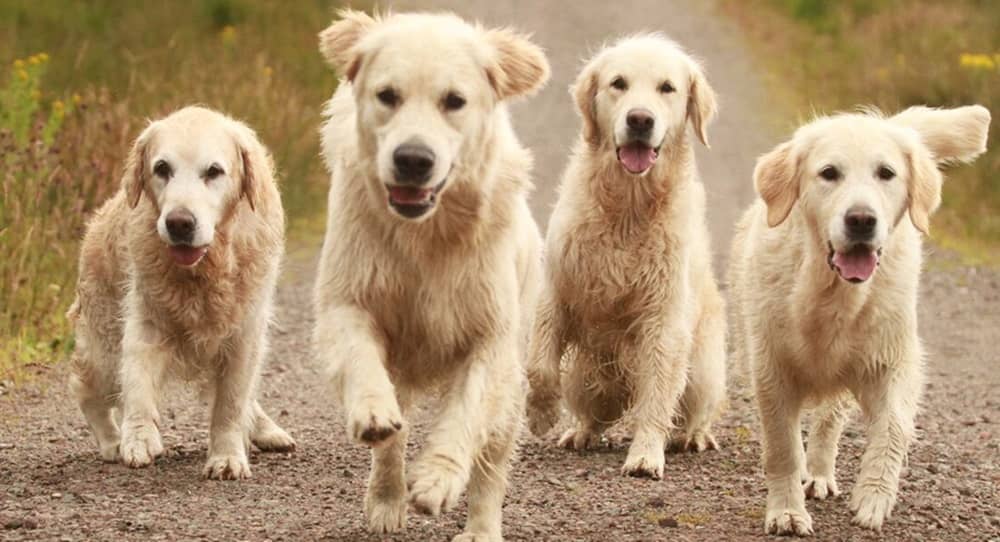
10-12 Months
A 1 year Golden Retriever has a lot of energy and they need regular exercise. It helps in preventing behavioral issues, such as chewing or digging. At this stage, you can take them, for longer walks of about 30-45 minutes. They can engage in more intense play, including hiking or running.
6-12 months old Golden Retriever Training Tips at Home
A 6-12 month-old Golden Retriever training requires consistency, patience, and a positive environment. Golden Retrievers are good learners. As you were training them in basic commands like “sit,” “stay,” and “come”, they started grabbing these demands. You can play with them with toys and spend time with them. Make them meet with new environment and people.
Give them Obedience training and tell them how to behave at home and with other people. Train them not to bite any close one. Give them leash training to ensure they walk calmly by your side. Also, Potty training will help them and you keep the home clean.
6-12 months old Golden Retriever Grooming Requirements
6-12 month old Golden Retriever grooming requires regular maintenance. Because at this stage, they are shedding more as their adult coat starts to come in. You need to brush in about 2-3 times a week to prevent matting and to reduce shedding. Their double coat requires attention, and using a slicker brush or undercoat rake, you can help remove loose hair and prevent tangles.
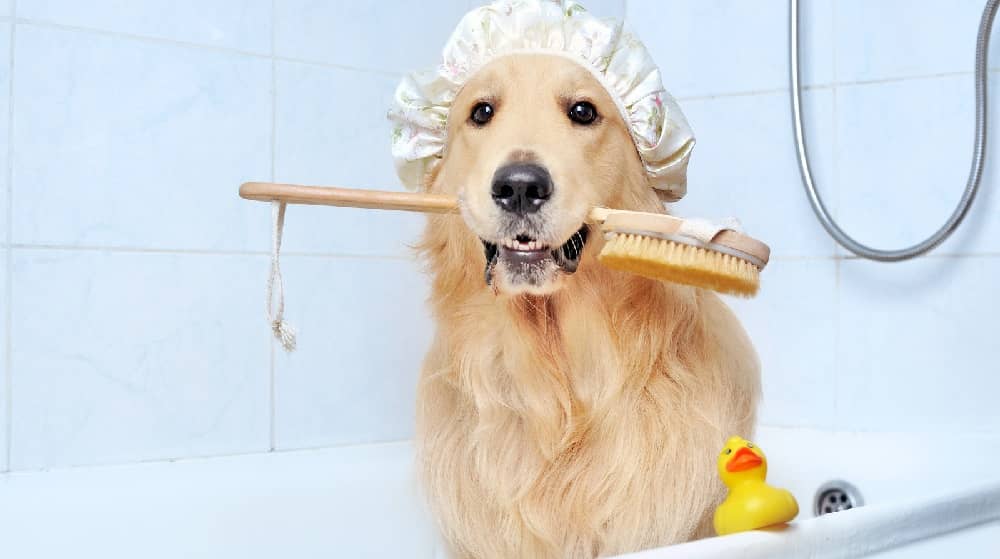
Give them regular bathing, but over-bathing should be avoided to protect their skin’s natural oils. Your Golden Retriever may also begin teething. So, you need to clean their teeth and ears to prevent infections, as Golden Retrievers are prone to ear problems due to their floppy ears. Nail trimming every 4-6 weeks is necessary to prevent overgrowth.
6-12 months old Golden Retriever Bed and Environment
6-12 months old Golden Retriever Health Care
While Golden Retrievers are generally healthy, they can develop a few health issues during this growth phase. Here are some common 6-12 months old Golden Retriever health issues:
- Hip and Elbow Dysplasia: Golden Retrievers are prone to these joint issues, especially as they grow rapidly. Taking them regularly for vet check-ups will help detect early signs of dysplasia and other musculoskeletal problems.
- Ear Infections: Due to their floppy ears, Golden Retrievers can be prone to infections. Check their ears regularly and clean them.
- Parasites: Clean and monitor them regularly to protect them from fleas and ticks.
Golden Retrievers: What to Expect
- Golden Retrievers grow quickly, reaching almost full size by 6-12 months, but they still develop physically until about 18 months.
- Expect high energy and need for daily exercise like walks, runs, and fetch, about 1 hour per day.
- They are intelligent and easy to train but may test boundaries during their adolescent phase (6-12 months).
- At 6-12 months of age, Golden Retrievers show more independence and may become stubborn or curious during training.
- Regular grooming is necessary, including brushing 2-3 times a week, and regular ear cleaning to prevent infections.
- Regular vet visits are essential, as common issues include hip dysplasia, elbow dysplasia, and allergies.
- During the 6-8 months, they may chew on objects as their adult teeth come in.
- Early socialization with other pets and people will help ensure your pup grows into a well-rounded, friendly dog.
- Golden Retrievers thrive on human interaction and will form strong bonds with their families.
- By 12 months, they begin to calm down and become more focused.
Where to get 6-12 Month-Old Golden Retriever from
The golden retrievers can be purchased from a reputable breeder who may have older puppies available. You can also reach out to some rescue organizations such as Golden Retriever Clum of America (GRCA). They may have often older puppies looking for loving homes. Moreover, you can visit local animal shelters or adoption centers, as they may occasionally have Golden Retrievers. Apart from these options, you can search out some online platforms like AKC Marketplace or PuppyFinder to get a golden retriever of the 99desired age.
Frequently Asked Questions
Question 1: Is my Golden Retriever fully mature at 12 months?
Answer: Golden Retrievers typically reach their full size by 12 months but continue to mature emotionally and mentally until about 18 months.
Question 2: How long can a 6-month-old Golden Retriever hold pee?
Answer: At 6 months old, a Golden Retriever can hold their bladder for about 6 hours during the day. Puppies develop better bladder control as they grow, but ensure they have frequent potty breaks, especially after meals, drinking water, or naps.
Question 3: What is the hardest age with a Golden Retriever?
Answer: The adolescent phase (6-18 months) is often the most challenging age for Golden Retriever owners. During this time, they may exhibit stubbornness, high energy, and testing boundaries as they mature. Consistent training and patience are essential to manage this phase.
Question 4: What is the best exercise for Golden Retrievers?
Answer: Golden Retrievers thrive on activities that engage their energy and intelligence. Fetch, swimming, and long walks are excellent exercises for them. These activities keep them physically fit and mentally stimulated. Regular playtime also helps build a stronger bond with your dog.
Question 5: What is the hardest puppy age?
Answer: The hardest puppy age is typically between 8–16 weeks and again at 6–8 months. During these stages, puppies may test boundaries, experience teething, and display behavioral challenges like chewing or whining. Consistent training and patience are key.
Question 6: How to potty train a Golden Retriever?
Answer: To train a golden retriever, take your Golden Retriever outside consistently after meals, naps, and play, rewarding them with praise or treats when they go potty in the right spot. Stay patient and avoid punishment to encourage learning.
Question 7: Does rubbing dogs’ nose in pee work?
Answer: No, rubbing a dog’s nose in pee does not work and is considered an outdated and harmful practice. It can lead to fear and anxiety, damaging the trust between you and your dog. Positive reinforcement and consistent potty training techniques are far more effective.
